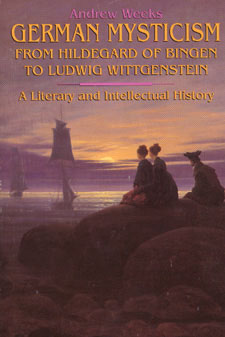
|
|
||
|
Boehme: An Intellectual Biography of the Seventeenth Century Philosopher and Mystic, (SUNY: 1991) and Andrew Weeks German Mysticism From Hildegard of Bingen to Ludwig Wittgenstein: A Literary and Intellectual History, (SUNY: 1993) Reviewed by Dr. Arthur Versluis Michigan State University
Certainly Germany has produced an astonishing array of theosophers, philosophers, and literary artists over the centuries, but remarkably, there are relatively few books in English about these traditions and their interrelationships. In fact, we very much need both close studies and broad surveys of the profound and complex connections among European and English esotericism and literature, for which the works of Antoine Faivre, mostly still in French, provide both academic groundwork and model. Here, Weeks provides two works that approach their topics from the rather different perspective of literary history: a general survey of German mysticism and a biographic introduction to the great German theosopher Jacob Boehme. In Boehme, Weeks aims to consider the visionary cobbler Jacob Boehme (1575-1624) "by interpreting his work with reference to the environment in which and for which it arose." Although at times Weeks's focus on the "specific time, place, culture, and character" of Boehme's writings threatens to submerge the enduring broader meanings of Boehme's works, much illuminating cultural context and reasonable interpretation is offered here. In reminding us that Boehme's writings emerged in a particular social milieu, Weeks's goal is to disentangle Boehme from the legends and "occultism" that have developed around him, and while Boehme's broader significance to us today would have made an interesting element in this book, the author's aim is to show us Boehme as he was, without legendary accretion or reductionist |
||